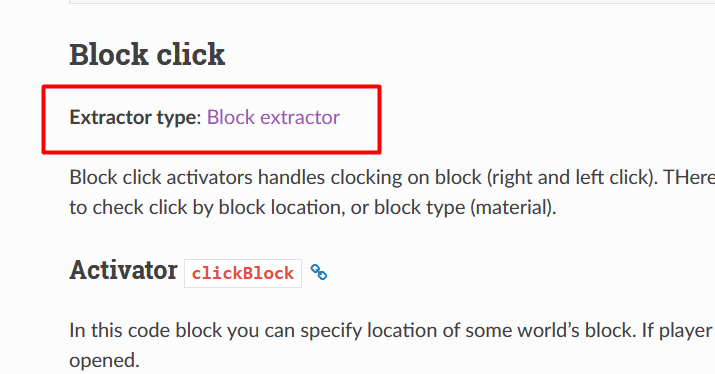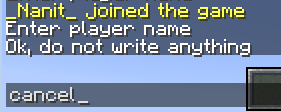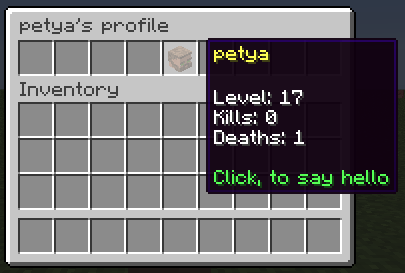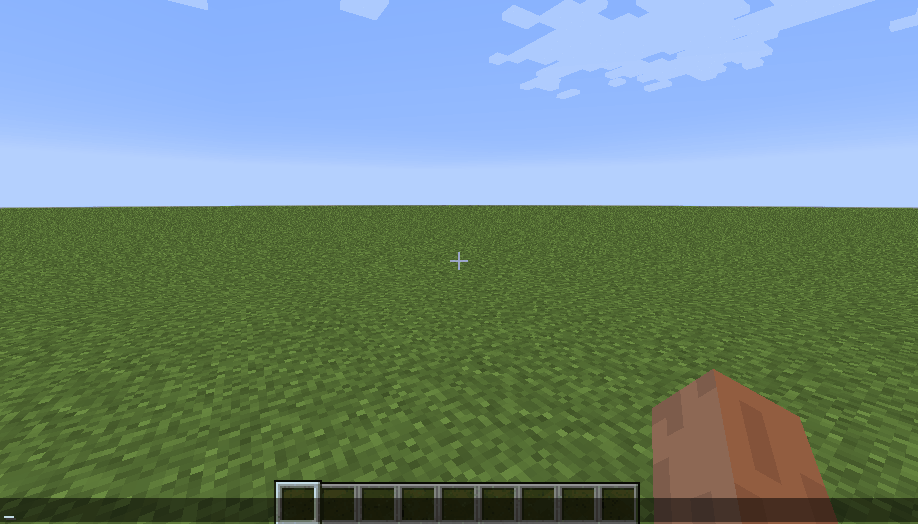User input
This article is about how you can save some user input and use it inside your menus.
Activator context
Almost all activators saves own state for each player. We called this state as Context. Context is any object such a:
Command which player entered
Block on which player clicked
Entity or NPC on which player clicked
WorldGuard region in which player entered
etc.
Each newly opened (through activator) menu has own context. AbstractMenus allows to get some values from this context just through placeholders.
Context placeholders
Access to context’s data via placeholders possible due Value Extractors. More about value extractors you can read in Value extractors topic. Here is just described way how to use spefic extractor as placeholder.
Each activator uses one of the predefined extractors to provide placeholders for own context.
To get access to activator context’s placeholders, you can use placeholder in next format:
%activator_<extractor placeholder>%
Each activator’s placeholder start with activator_ prefix. The <extractor placeholder> is a placeholder which defined for specific extractor.
How to use context placeholer of activator
The algorithm of using context placeholder for activators is simple:
Go to Activators page.
Find required activator.
Under each activator you can find extractor which this activator uses. This is a link which refers to table of placeholders of this extractor.

Extractor type which activator uses
Go to table of placeholders of this extractor.
Select required placeholder.
Add
activator_prefix to this placeholder.Use the resulting value as a placeholder in your menu.
Example 1. Using context placeholders
For example, let’s say you use clickEntity activator:
activators {
clickEntity {
type: SHEEP
}
}
After you clicked on any sheep entity, you can use context placeholders in rules, actions and item properties. Remember, that we use extractor’s placeholders with this format: %activator_<extractor placeholder>%. Example:
title: "Sheep menu"
size: 1
activators {
clickEntity {
type: SHEEP
}
}
items: [
{
slot: 0
material: CAKE
name: "Sheep name: %activator_entity_custom_name%"
click {
message: "&aCurrent sheep location: %activator_entity_loc_x%, %activator_entity_loc_y%, %activator_entity_loc_z%"
}
}
]
Here we used entity_custom_name, entity_loc_x, entity_loc_y and entity_loc_z extractor placeholders, which defined in this place
Commands building
AbstractMenus has powerful system to build commands and use entered arguments in menus.
In this topic we will talk about more complex format of the command activator with taking arguments.
Other information about this activator you can find in Activators article.
Command format
To build command with arguments, you need to make command activator as an Object.
This object has several required and optional parameters. Below is full structure of commands activator.
Key |
Type |
Note |
Required |
|---|---|---|---|
name |
String |
Base name of the command |
true |
aliases |
Strings list |
Aliases of base name |
false |
error |
String |
Custom error message |
false |
help |
String |
Custom help message prefix |
false |
args |
Strings list, Objects list |
Command arguments |
false |
override |
Boolean |
Try to override command from other plugin |
false |
The error field can contain %s placeholder to insert error message from specific argument.
The help field also can contain %s placeholder to insert generated command help based on command structure.
Example of using error and help fields:
command {
name: "mycmd"
error: "&cInvalid input: %s"
help: "&eCommand structure: %s"
}
The args field is a list that can accept one of the two types of arguments: Simple or Typed.
As described in Command extractor topic, commands activator uses Command Extractor to get paraed values from entered command. Example of using this extractor you can see in topic below.
Simple arguments
Simple arguments is just list of argument keys. Every argument is a string, so user can enter anything. Example:
command {
name: "mycmd"
args: [ "myarg1", "myarg2" ]
}
After reloading, AbstractMenus will expect that player will enter command in format:
/mycmd <myarg1> <myarg2>
When player entered command and all arguments specified, menu will be opened. Otherwise player receives error message.
To get values which player entered, you need to use context placeholders, as described above. Just see which placehodlers provides Command extractor and add activator_ prefix in begin. Example:
message: "You entered %activator_cmd_arg_myarg1% and %activator_cmd_arg_myarg2%"
Typed arguments
Typed arguments allows you to expect players to enter arguments of a certain type. If player entered something wrong, he will get error message.
There are several types of arguments.
- string:
Simple string argument. Player can enter anything, without space symbol.
- number:
Any number: float or integer. Fails if number cannot be parsed from user input.
- integer:
Integers only. Fails if number cannot be parsed to integer from user input.
- player:
Online player name. Will suggest all players on tab complete, and fails if player not found.
- choice:
Predefined string options. Will be suggested on tab complete. Player must select one of the suggested options.
Each typed argument is an object with parameters. All they has general fields which described below:
Key |
Type |
Note |
Required |
|---|---|---|---|
key |
String |
Unique argument name, which you will use in placehodlers |
true |
type |
String |
Argument type. See all types above |
true |
error |
String |
Custom error message |
false |
default |
String |
Default value of argument. Makes argument optional |
false |
Example 1. Number argument
command {
name: "mycmd"
args: [
{
key: "amount"
type: number
}
]
}
Then to get value from this argument, we will use this placeholder:
message: "&eAmount: %activator_cmd_arg_amount%"
Example 2. Choice argument
The choice argument type required one additional field: options. This is a list of strings. Each element is an option.
command {
name: "mycmd"
args: [
{
key: "variant"
type: choice
options: ["opt1", "opt2", "opt3"]
}
]
}
Then to get selected option from this argument, we will use this placeholder:
message: "&eSelected %activator_cmd_arg_variant%"
Example 3. Player argument
Player argument takes only online player name and suggest these names on tab complete.
command {
name: "mycmd"
args: [
{
key: "username"
type: player
}
]
}
Then to get name of player from this argument, we will use this placeholder:
message: "&ePlayer: %activator_cmd_arg_username%"
Using regular placeholders for player argument
The player argument has one cool feature. In cases when you use player argument,
AbstractMenus saves entered player and provides access to their regular placeholders. Example:
command {
name: "mycmd"
args: [
{
key: "player1"
type: player
},
{
key: "player2"
type: player
}
]
}
For example, we need to get level of these two players. Command extractor gives access to this and other placeholders. Following extractor’s placeholder format (<key>:<placeholder>), which described in Command extractor topic, we need to specify two parameters: argument’s key and placeholder which we want to use. We want to use player_level placeholder, so our final placeholder will looks like:
%activator_player1:player_level%
and
%activator_player2:player_level%
Default arguments
Let’s talk more about default argument’s field. In some cases you need to make some argument optional. For example, you want to make profile menu. If player entered username, then profile of other player will be opened. If no, then will be opened profile of player who entered command.
For logic like this, you can add default value to some argument. You can use regular placeholders in default values. Example:
command {
name: "profile"
args: [
{
key: "user"
type: player
default: "%player_name%"
}
]
}
If player enter /profile, then user argument will be equal name of player who entered command.
If player enter /profile Notch, then user will be Notch.
Currently, AbstractMenus has some resctiction for optional arguments. You can make only one optional argument and put it only in the end of arguments list. This due arguments parsing algorithm, which can’t know which argument you entered, if there are more than one optional argument.
Command overriding
Sometimes we need to override command from other plugin.
For example, you have third-party plugin with /kit command.
Suppose we want to create menu which will be opened by the same command and will show list of available kits. By default, AbstractMenus register command by regular way. This means that any menu command may be overwritten by other plugins.
To override plugin command, you can add override: true parameter to the command activator body. Example:
activators {
command {
name: "kit"
aliases: ["kits"]
override: true
}
}
Command with override: true, will be registered as chat listener, not only as regular command.
This will allow to “override” third-party plugin command, even if AbstarctMenus loaded after this plugin.
When user enter such command, plugin performs it as regular command and cancel next message handling to avoid performing this command by the real “command owner”.
Chat Input
Action inputChat allows you to request some text input to player.
Below is the structure of this action.
Parameter |
Type |
Note |
Required |
|---|---|---|---|
into |
String |
Name of variable in which data will be saved |
true |
global |
Boolean |
If |
false |
cancelOn |
String |
A ‘stop word’ or phrase that will cancel waiting for input. If input cancelled, actions inside |
false |
onInput |
Object |
Actions for completed input |
false |
onCancel |
Object |
Actions for cancelled by stop word input |
false |
The only required paramater is a into. This is the name of variable.
When player enter a text in the chat, plugin save this text into variable with specified name.
After this, you can get value if this variable anywhere through variable placeholder.
Basic example:
slot: 0
material: STONE
click {
message: "Enter player name"
inputChat {
into: "input_username"
}
}
If player clicked on this item, menu will be closed with message. After this, player must write something in chat.
If you want to perform some action, after text entered, you need to use onInput actions block. Example:
slot: 0
material: STONE
click {
message: "Enter player name"
inputChat {
into: "input_username"
onInput {
command: {
console: "say Hello, %varp_:input_username%!"
}
}
}
}
Result:

Waiting for input
Here, when player entered something in the chat, all players will
see Hello, <text>! where <text> is a text, entered by player.

Input completed
Note
After performing inputChat, menu will be closed automatically. Do not close it manually by closeMenu action.
Input Cancelling
If you want to add ability to cancel text input, you can add cancelOn parameter to the action.
Example:
slot: 0
material: STONE
click {
message: "Enter player name"
inputChat {
into: "input_username"
cancelOn: "cancel"
onInput {
command: {
console: "say Hello, %varp_:input_username%"
}
}
onCancel {
message: "Ok, do not write anything"
}
}
}
Here we also added onCancel block to send message to player if input cancelled.
If player entered cancel in the chat, plugin will not wait for input anymore, and performs action inside onCancel if it specified.

Input cancelled by stop-word
Restrictions
Note, that not all stuff, that available in menu, allowed inside onInput and onCancel blocks.
Since menu is closed while waiting for input, you can only use actions which are not interacts with menu inventory.
Do not use actions like refreshMenu, closeMenu, openMenu, etc.
Context placeholder also won’t work inside these action blocks. This is not possible due menu lifecycle, so you can use only common placeholders and variables.

